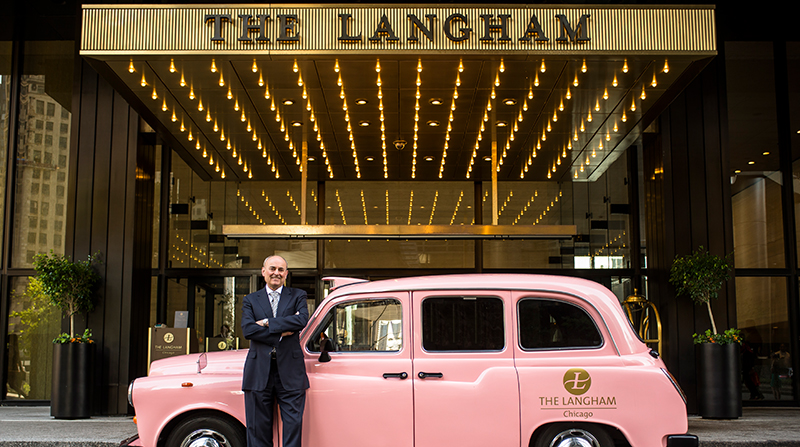

Managing director Robert Schofield. Credit: The Langham, Chicago
It’s difficult to earn a Forbes Travel Guide Five-Star award — only 20 percent of all hotels rated attain the honor — but it’s even harder to maintain it. The Langham, Chicago hit a hot streak, winning the top accolade for five years in a row. The 52-story riverfront hotel also holds the distinction of having the only Five-Star spa in the city.
We talked to hotel managing director Robert Schofield to find out what it takes to achieve excellence year after year, the most underrated amenity at the property and what you should do on your next Chicago visit.
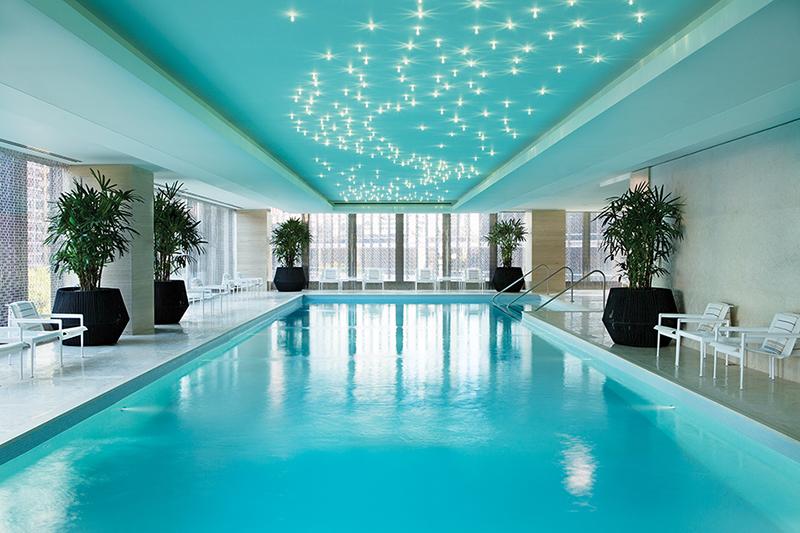
The Alluring Pool. Credit: The Langham, Chicago
What’s The Langham, Chicago’s secret to continual Five-Star success?
The Langham brand itself was not very well-known in the United States when we decided to build the Chicago company, and therefore we were faced with some real big challenges in terms of our competition because we have some really great hotels here in Chicago — the Peninsula, the Waldorf and the Ritz.
We said, “Okay, how are we going to introduce a sort of limited name, not a lot of recognition, a Five-Star property against the big brands?” The only way we could do that was to establish the best hotel.
We set about seeing what standards we would need to do that. [We blended] in the Forbes [Travel Guide] standards into Langham brand standards and then basically created a vision for all our colleagues that we employ.
Most importantly, with any product at all, it’s the consistency of that product. So to make sure that we were consistent in what is a human service type of business is in many ways much more challenging than creating a motorcar or suit or any other product that you put to the public. They can test it before they go out, and therefore the guest gets something that has already been checked as being perfect.
Human beings aren’t quite the same in terms of being perfect, and we have to instill a culture into the hotel whereby each colleague actually feels ownership of our product. And through ownership of our product, they have to engage with our guests, they effectively have to take that ownership to deal with any guest inquiry at any point in time. And through tens and twenties of thirties of contact points in that whole of the guest experience, not one of those can be adverse. Because as we all know, the one that you remember is the one that doesn’t go well.
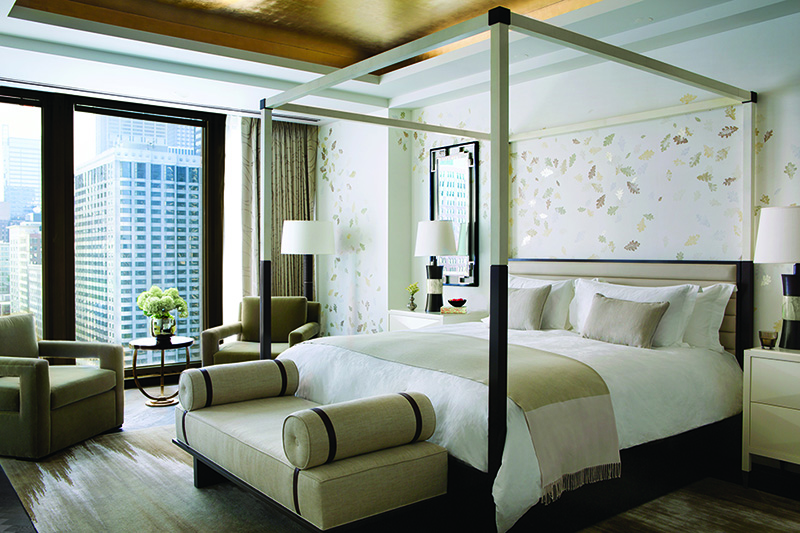
Infinity Suite. Credit: The Langham, Chicago
We don’t employ guest relations managers in the hotel, which is odd. I know many, many Five-Star hotels do. The philosophy behind that was really every single colleague has to take responsibility to be the guest relations manager. So effectively everybody has to take action on the spot to meet the needs of the guest. The key thing there is each and every one of our colleagues is personally empowered to do that. We expect it from every one of our colleagues. And we orientate them to that right at the beginning. We try to employ colleagues that are willing to take ownership, that are naturally hospitable, keen to please the guest, and this will create a total environment whereby everybody is a guest relations manager.
If we have guests who leave without great memories, we have failed. We have a beautiful stage, a beautiful hotel. But a stage is a stage, and at the end of the day, it’s the performance on that stage that creates the memories for our guests.
To make something consistent, you have to have processes in place. Once those processes are in place, you have to continually review what your colleagues are doing. The same way that if you were a producer of a stage production, you would be watching what everybody was doing on that stage all of the time to make sure everything was perfect and was in accordance in what your goals and objectives were.
We have the same attitude with our departmental managers. They effectively have their stages via the Pavilion restaurant, Travelle restaurant or spa. It doesn’t matter which location in the hotel — the manager in charge of that, it’s their show. They have to watch the body language, they have to watch the reactions of our colleagues towards guests and basically make sure they are in full compliance with the training we’ve given them.
But most of all, it’s hiring the right people who actually want to do this and want to be part of building the reputation of the hotel, maintaining the reputation of the hotel.
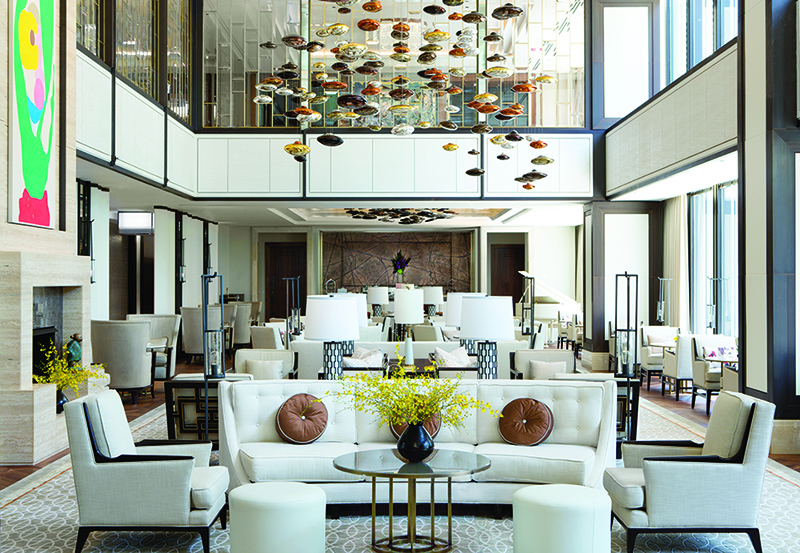
Pavilion. Credit: The Langham, Chicago
What are the biggest challenges of running a Five-Star hotel?
The biggest challenge is to be better every day. You can never rest on your laurels, you have to effectively all day, every day, look at every aspect of the operation and see how it can be better, whether the maintenance department, the kitchen, the restaurant, the spa — the whole team has to continually be looking to see how they can get better.
Challenges come and go. The market conditions in a hotel change. Sometimes you’ll have a bigger demand in the marketplace, sometimes a lesser demand. Maybe new hotels are built and that becomes challenge, because now the guest has more opportunities. We have to build guest loyalty through their interactions with us so they will continually come back and spend time with us.
The challenges going forward: it’s a tight labor market in Chicago and nationally. We have to make sure we hire the right people. We only hire 2 percent of the applicants that actually apply to us. We have to make sure we retain the colleagues we have, and we do that through a big concentration on our colleagues in terms of what their individual needs are for the next five years. We look at the succession planning processes that we incorporate into the hotel. We train people, we recognize and respect each and every our colleagues for the part they play. At the end of the day, it’s a one team, one dream situation. Our goal now is to become a legendary Langham.
In your five years of having the Five-Star award, how has the luxury traveler changed?
I think much more casual elegance as opposed to formal elegance. Things don’t change drastically over a five-year period. But things tend to evolve. The world is a much more casual environment. We maintain a graciousness. We definitely don’t want to be formal and stuffy — and we never were when we opened the hotel.
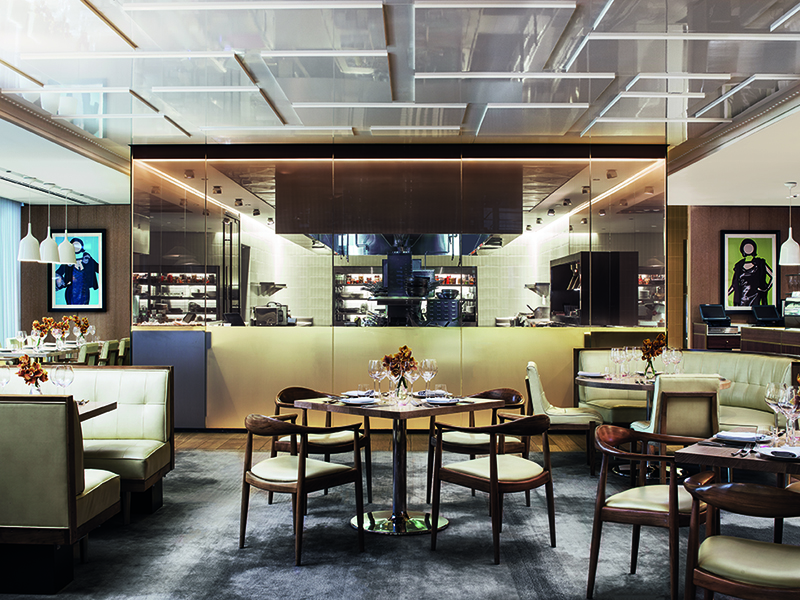
Travelle. Credit: The Langham, Chicago
What’s an underrated feature at the hotel?
I think the club lounge on the 13th floor. Many hotels in the past had butlers that went to guest rooms and knocked on doors to ask if guests effectively wanted any services.
We incorporated our butlers into our club lounge, which is a very unique, relaxing area with food available for breakfast, lunch, afternoon tea and dinner. And that has been so popular. The panoramic view covers Lake Michigan and the whole of the riverwalk and the river itself.
The goal of the butlers in the club lounge is to have a private check-in facility and very much a personalized level of service whereby the guest meets the butlers all day long, rather than just meeting them when they have tea in a normal situation. Now the butlers get the guests the minute they arrive, they check them in, they escort them to the room, they provide other services for them if they want a bath run or want their luggage unpacked.
How has Chicago changed in the six years you’ve been at the Langham?
We’ve seen a very lovely evolvement on the Chicago Riverwalk whereby the walking and entertainment area has been expanded for a great distance all the way up to Lake Street. That is literally what we look out onto — the Chicago Riverwalk and the Chicago River. So that’s been much more of a leisure destination now, which has brought a lot of business down into this part of town where we are located.
What are some of your favorite places in Chicago?
The riverwalk. You have all the restaurants, you have the kayaking — it’s lovely. The architectural tour is obviously right outside our windows, and that is such a popular thing for anybody coming to Chicago.
If you want to go a little further north, you can go to Lincoln Park. I personally love that area for walking dogs. It has a zoo, it has the lakefront down there, it has a lot of people sunbathing during the summer months and bicycling up and down there all year round. It’s a really memorable section of Chicago, for sure.
